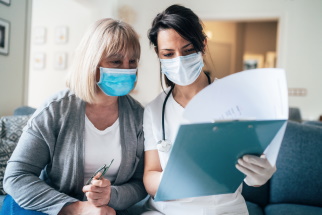May 2021
Don't Hit the Pause on Health Screenings
The COVID-19 pandemic has delayed many plans, from overseas vacations to large indoor gatherings. But there’s one thing you shouldn’t put off any longer: health screenings.

Screenings catch many health problems early, before you have symptoms and when they’re easier to treat. Getting these tests is one of the best ways to stay healthy. And the better your health, the easier it is to cope with any crisis.
The danger of delays
Healthcare providers briefly discouraged nonurgent visits in the pandemic’s early days, but Americans’ reluctance has lingered, with about 2 in 5 people putting off or skipping medical care because of COVID-19 concerns.
These skipped screenings can have consequences. The American Cancer Society estimates that in spring 2020 alone, missed mammograms resulted in 36,000 women not being diagnosed with breast cancer.
Screening tests also catch other cancers, high blood pressure and cholesterol, diabetes, and mental health problems. If these problems go undetected, the effects could be dire.
Screening safely
Call or email your provider’s office to make sure you’re up-to-date. Your provider will determine which screenings you need based on age, genetics, and previous test results. Also discuss:
-
Alternative options. Certain screenings can be done safely at home. For instance, a stool DNA test checks for colorectal cancer. You’ll still need a colonoscopy if the results come back positive. But if they’re negative, you’ve saved yourself a visit.
-
Virtual appointments. Other tests can be done via telehealth. For instance, your provider can assess your risk for depression or addiction during a remote chat.
-
Office safeguards. Medical facilities are taking steps to keep you and your family safe. This includes screening for COVID-19 and creating space for physical distancing. Check websites or contact the office if you have questions about protocols.
When you go for an appointment, protect yourself and others by wearing a mask. And call ahead if you, or someone in your household, has signs of COVID-19.